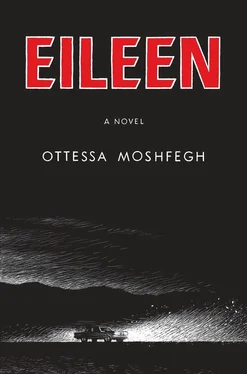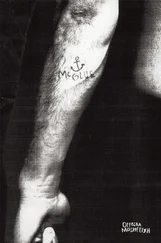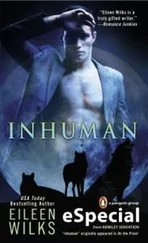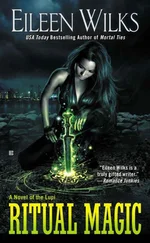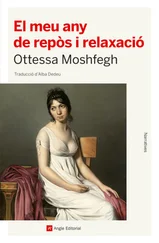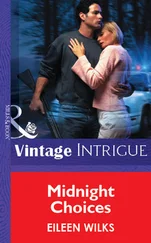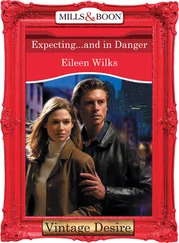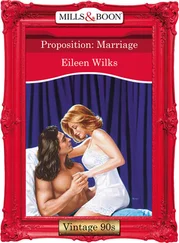“Hi, Dad,” I said, passing him on the stairs.
He was not a very large man, but he had broad shoulders and long legs, a sort of regal look about him. His thinning gray hair stood up high and bowed over the crown of his head. His face appeared to be decades older than he really was, and bore in it a wide-eyed skepticism and a look of perpetual disapproval. In retrospect he was much like the boys in the prison where I worked — sensitive and angry. His hands shook all the time no matter how much he drank. He was always rubbing at his chin, which was red and drawn and wrinkled. He’d tug at it the way you’d rub the head of a young boy and call him a little rascal. His one regret in life, he said, was that he’d never been able to grow a real beard, as though he could have willed it, but he had failed to. He was like that — regretful and arrogant and illogical at once. I don’t think he ever really loved his children. The wedding band he continued to wear years after her death suggested that he’d loved our mother to some degree at least. But I suspect he was incapable of love, real love. He was a cruel character. Imagining his parents beating him as a child is the only path to forgiveness that I have found so far. It isn’t perfect, but it does the trick.
This isn’t a story of how awful my father was, let me be clear. Bemoaning his cruelty is not the point of this at all. But I do remember that day on the stairs, how he winced when he turned to look up at me, as though the sight of me made him ill. I stood on the landing, looking down.
“You’re going out again,” he croaked, “to Lardner’s.” Lardner’s was the liquor store across town. He let the empty sherry bottle slip from his fingers and roll down the staircase, step by step.
I’m very reasonable now, peaceful even, but back then I was easily enraged. My father’s demands that I do his bidding like a maid, a servant, were constant. But I was not the kind of girl to say no to anyone.
“All right,” I said.
My father grunted and puffed on the short butt of his cigar.
When I was disturbed, I took some comfort in attending to my appearance. I was obsessed with the way I looked, in fact. My eyes are small and green, and you wouldn’t — especially back then — have seen much kindness in them. I am not one of those women who try to make people happy all the time. I’m not that strategic. If you’d seen me back then with a barrette in my hair, my mousy gray wool coat, you’d have expected me to be just a minor character in this saga — conscientious, even-tempered, dull, irrelevant. I looked like a shy and gentle soul from afar, and sometimes I wished I was one. But I cursed and blushed and broke out in sweats quite often, and that day I slammed the bathroom door shut by kicking it with the full sole of my shoe, nearly busting the hinges. I looked so boring, lifeless, immune and unaffected, but in truth I was always furious, seething, my thoughts racing, my mind like a killer’s. It was easy to hide behind the dull face I wore, moping around. I really thought I had everybody fooled. And I didn’t really read books about flowers or home economics. I liked books about awful things — murder, illness, death. I remember selecting one of the thickest books from the public library, a chronicle of ancient Egyptian medicine, to study the gruesome practice of pulling the brains of the dead out through the nose like skeins of yarn. I liked to think of my brain like that, tangled up in my skull. The idea that my brains could be untangled, straightened out, and thus refashioned into a state of peace and sanity was a comforting fantasy. I often felt there was something wired weird in my brain, a problem so complicated only a lobotomy could solve it — I’d need a whole new mind or a whole new life. I could be very dramatic in my self-assessments. Besides books, I enjoyed my issues of National Geographic magazine, which I got delivered to me in the mail. That was a real luxury and made me feel very special. Articles describing the naive beliefs of the primitives fascinated me. Their blood rites, the human sacrifices, all that needless suffering. I was dark, you might say. Moony. But I don’t think I was really so hardhearted by nature. Had I been born into a different family, I might have grown up to act and feel perfectly normal.
Truth be told, I was a glutton for punishment. I didn’t really mind getting bossed around by my father. I’d get angry, and I loathed him, yes, but my fury gave my life a kind of purpose, and running his errands killed time. That is what I imagined life to be — one long sentence of waiting out the clock.
I tried to look miserable and exhausted when I came out from the bathroom that evening. My father groaned impatiently. I sighed and plucked the cash he held out. I buttoned my coat back up. I was relieved to have somewhere to go, a way to pass the evening hours other than to pace the attic or watch my father drink. There was nothing I loved more than leaving the house.
If I had slammed the front door hard on my way out, as I was tempted to, one of those icicles overhead would have surely cracked off. I imagined one plummeting through the hollow of my collarbone and stabbing me straight through the heart. Or, had I tilted my head back, perhaps it would have soared down my throat, scraping the vacuous center of my body — I liked to picture these things — and followed through to my guts, finally parting my nether regions like a glass dagger. That was how I imagined my anatomy back then, brain like tangled yarn, body like an empty vessel, private parts like some strange foreign country. But I was careful shutting the door, of course. I didn’t really want to die.
Since my father had become unfit to drive it, I drove his old Dodge. I loved that car. It was a four-door Coronet, matte green, full of scrapes and dents. The floorboards had rusted through from years of salt and ice. I kept in the glove box of the Dodge a dead field mouse I’d found one day on the porch frozen in a tight ball. I’d picked it up by its tail and swirled it through the air for a moment, then slung it in the glove box with a broken flashlight, a map of New England freeways, a few green nickels. Every now and then that winter, I’d peek at the mouse, check on its invisible decomposition in the freezing cold. I think it made me feel powerful somehow. A little totem. A good luck charm.
Outside I tested the temperature with the tip of my tongue, sticking it out into the biting wind until it hurt. That night it must have been down close to single digits. It hurt just to breathe. But I preferred cold weather over hot. Summers I was restless and cranky. I’d break out in rashes, have to lie in cold baths. I’d sit at my desk in the prison whipping a paper fan furiously at my face. I did not like to sweat in front of other people. Such proof of carnality I found lewd, disgusting. Similarly, I did not like to dance or do sports. I did not listen to the Beatles or watch Ed Sullivan on TV. I wasn’t interested in fun or popularity back then. I preferred to read about ancient times, distant lands. Knowledge of anything current or faddish made me feel I was just a victim of isolation. If I avoided all that on purpose, I could believe I was in control.
One thing about that Dodge was that it made me sick to drive it. I knew there was something wrong with the exhaust, but at the time I couldn’t think of dealing with such a problem. Part of me liked having to roll down the windows, even in the cold. I thought that I was very brave. But really I was scared that if I made a fuss over the car, it would be taken away from me. That car was the one thing in my life that gave me any hope. It was my only means of escape. Before he’d retired, my father had driven it on his days off. He’d wheeled it around town so carelessly — parked up on curbs, screeched around corners, stalled out on no gas at the dead of night, scraped it alongside milk delivery trucks, the side of the AMP building, and so forth. Everybody drove drunk back then, but that was no excuse. I myself was a decent driver. I never sped, never blew through red lights. When it was dark out, I liked to drive slowly, foot barely on the pedal, and watch the town roll by like in a movie. I always imagined other people’s homes to be so much nicer than mine, full of polished wood furniture and elegant fireplaces and stockings hung for Christmas. Cookies in the cupboards, lawn mowers in the garages. It was easy to think of everyone having it better than me back then. Down the block, one illuminated vestibule made me feel particularly disparaged. It had a white bench and a blade by the door like an upturned ice skate to scrape the snow from your boots and a garland of holly hung on the front door. The town was a pretty place, quaint, you’d call it. And unless you’ve grown up in New England, you don’t know the peculiar stillness of a coastal town covered in snow at night. It is not like in other places. The light does something funny at sunset. It seems not to wane but to recede out toward the ocean. The light just gets pulled away.
Читать дальше
